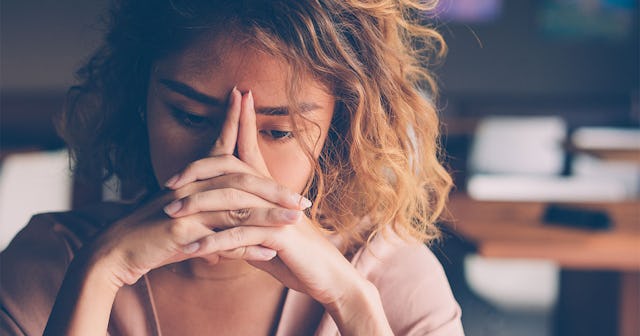What It's Really Like To Have Repressed Memories Surface

When my mother died in June of 2020, I thought the worst was behind me. She was mentally unstable, physically unwell, and — due to alcoholism and her (various) illnesses — she was neglectful. I was forced to feed, care for, and raise myself from the young and tender age of 12. She was also mean. Very mean. My mother told me I was dumb and worthless. She called me names, like “stupid” and “bitch,” and once she referred to me as a mistake.
These are things you always remember. They are words you never forget. But after her passing, other memories came flooding forward. A rash of memories, full of pain, sadness, and abuse. And when the dam broke, I was ill-prepared, paralyzed by the barrage of broken promises and bad dreams.
Of course, it began slowly. Innocuously. A long-forgotten memory here, a general feeling of unease or fear there, but I didn’t think much of it. After all, I’m 36. Childhood memories surface all the time, especially when I’m parenting my own baby boy and little girl. Plus, I’m riddled with anxiety. I hide from my shadow. I make (proverbial) mountains out of mole hills. But these memories were different. They were fearful. Uncomfortable. And some were borderline unrecognizable. I mean, I recall them faintly, but not specifically. They were buried in the dark recesses of my brain.
But what did they look like? What were these long buried memories?
In one, I’m my daughter’s age. Seven, maybe eight. I’m showering, washing my body with a faded cloth behind a clear, teddy bear-covered curtain when I see a faint red light flickering near the door. It blinks just outside the bathroom, in the hall. When I pull back the curtain, I see a video camera pointed at me. I laugh, shrugging it off, as I have done most of my life. Giggles hide discomfort. Laughter hides the hurt. But something feels off. I am unsettled. Nervous. Urine runs down my legs. Something isn’t right.
In another, I am 15. I am sitting in a dimly lit office, my arms folded across my t-shirt clad chest. My mother is beside me, seated in a brown leather armchair, and the psychiatrist is discussing why family counseling is (in our case) a good idea. She grimaces, huffs, and then — with her nicotine-laced breath — she says “I’m not the one with the fucking problem. She is. She’s got the issues. She is an issue.”
There are blips like this throughout my childhood — sprinklings of emotional trauma here and sexual trauma there. Sprinklings that come up when I am triggered by sensations, feelings, tastes, sounds, and smells.
Why? Because I now know I live with PTSD, or post-traumatic stress disorder, and one of the hallmarks of said disorder is the sudden appearance of recurrent, unwanted, distressing memories, some of which have been buried and repressed.
“Significant events in life tend to linger in your memory. Some might spark happiness when you recall them. Others might involve less pleasant emotions,” a Healthline article about memory explains. “You might make a conscious effort to avoid thinking about these memories. [However,] repressed memories… are those you unconsciously forget. They generally involve some kind of trauma or a deeply distressing event.” This has been the case for me.
All of my repressed memories have been extremely disturbing, and when they surface, I am consumed by them. Swallowed. Frozen. I am sitting in my living room one second, laughing and playing with my kids, and the next second I am crying, watching my childhood self being yelled at and struck. I can literally smell the broken black leather of my father’s belt. Because repressed memories and flashbacks aren’t like other memories. It’s not like looking at a picture or remembering your first grade trip to Disney World. It’s tangible; visceral. They feel and seem real.
The good news is that repressed memories, and all PTSD-induced memories, can be managed with therapy, mindfulness, and medication. I take antidepressants and antipsychotics to keep my days (and mind) managed and the symptoms at bay. I take anxiety medication as needed; for example, I take Xanax when the voices become too loud and the flashbacks become too intense. And I have dozens of self-care tools in my toolbox and belt. I run, hike, bike, journal, dance, draw, listen to music, and talk to friends.
While these memories are still surfacing — while I’m still learning about my past in the present — having a plan helps me in the moments when they threaten to swallow me whole.
This article was originally published on